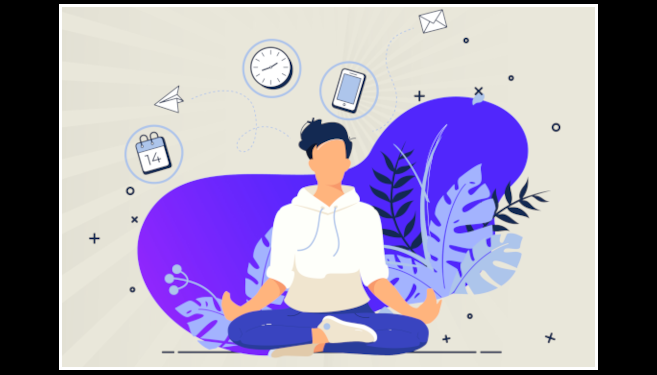 Webinar encourages students to apply stress management techniques in preparation for their exams.
Webinar encourages students to apply stress management techniques in preparation for their exams. UKZN Webinar Equips Students with Stress Management Techniques Ahead of Exams
Mind Matters: Meditation, Breathwork and Exercise was the title of a webinar hosted by UKZN to help students prepare for exams by imparting stress management techniques.
Ms Mariam Jassat, a counselling psychologist from the Student Support Services Division, welcomed participants and highlighted the webinar’s goal of assisting students in finding calm amidst the pressures of exams. The event aimed to share valuable insights on stress management through meditation, breathwork, and exercise.
During the webinar, Associate Professor Surendran Pillay, from the College of Law and Management Studies, emphasised the importance of specific nutritional foods for mental well-being, such as nuts, seeds, berries, fatty fish, leafy greens, and avocados. He also advised students to avoid substances like caffeine, sugar, alcohol, drugs, and marijuana during the exam period.
Pillay said that breathwork involves a variety of exercises and techniques that make use of breathing patterns to improve physical, mental and emotional well-being. He noted ‘deep breathing as taking slow, deep breaths that expand and contract the abdomen, diaphragmatic breathing as belly breaths, and pranayama as yoga breathing exercises aimed at controlling the flow of “life force energy” in the body.’
Pillay defined meditation as a practice of training the mind to induce a state of consciousness, covering mindful meditation, mantra-based meditation, concentration meditation, and sound meditation. He highlighted applications like Headspace and Bhuddify that can aid meditation practices.
Reviewing the benefits of mindfulness, Pillay underscored its positive effects on memory enhancement, cognitive function, increased IQ, and neurophysiological changes.
Counselling psychologist in the College of Humanities, Mr Rethabile Oliphant, emphasised the power of positive thinking in shaping one’s life expectations. Oliphant noted how difficult circumstances can result in people not believing that things can change and get better and encouraged students to view challenges as opportunities for self-discovery and personal growth.
Ms Andile Mkhize, Student Development Officer in the College of Law and Management Studies, defined self-care as essential activities for maintaining physical and mental well-being. Using a battery as an analogy, she said, ‘If we allow our battery to deplete completely then we won’t be able to study or write at our optimal level, whereas if we keep the battery topped up by engaging in self-care, it allows more energy and resilience in approaching our academic demands.’ Mkhize highlighted some of the signs that indicate a lack of self-care which include being irritable, lack of concentration, low motivation/lack of interest, increased anxiety, moodiness, insomnia, fluctuating appetite and weight, fatigue, headaches, and hair loss.
Student Development Officer in the College of Agriculture, Engineering and Sciences, Mr Sanele Zuma, highlighted time management as one of the biggest threats to students’ academic success. Noting self-management as a change in attitude, he said it was important for students to enrol in programmes that they are passionate about, prioritise studying, and give their education their all - so as not to live with regret.
Ms Suzanne Stokes, an educational psychologist in the College of Health Sciences, encouraged students to set a new study strategy that involves partaking in active learning which includes summarising, note-taking and self-testing in order to retain more information and improve performance; as well as to study in groups and to engage in active reading. Discussing exam-taking strategies, Stokes said that students should read the instructions carefully, manage time effectively, and review their answers after they are done.
Pillay gave a demonstration of the various breathing techniques that students can engage in one or two minutes before meditation, namely, deep breathing, pranayama and alternative nostril breathing. He highlighted how meditation should be conducted in a quiet, clean place - preferably close to nature - before going over the mantra-based meditation which uses the Hong Sau method and can be done for 10 minutes.
Pillay also invited students to join his yoga classes every Wednesday on the Westville campus and to email him at pillays18@ukzn.ac.za for further details.
Closing off the webinar, Jassat thanked the panellists and attendees and wished the students the best for their exams.
Click here to watch the Mind Matters: Meditation, Breathwork and Exercise webinar.
Words: Hlengiwe Khwela
Image: Supplied



